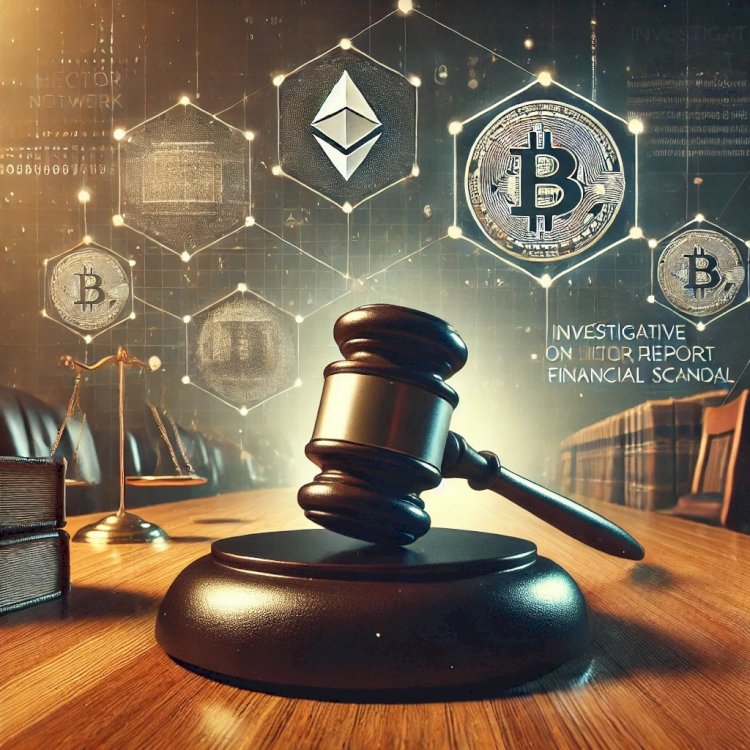Hector DAO Investigated: Uncovering the Extent of Mismanagement and Manipulation

Once a prominent name in decentralized finance (DeFi), Hector DAO is now at the center of a significant financial scandal. Investigations have revealed a series of manipulative actions and fraudulent projects by its management, reducing the organization's treasury from $130 million to just $8 million. These shocking findings have alarmed the investor community, leading to legal actions and a thorough review by the Eastern Caribbean Supreme Court, Commercial Division, in the British Virgin Islands (BVI).
Lavish Salaries and Exploitative Practices
Key figures within Hector DAO, including Marco Rohrer, Marco Boer, Sasha Rohrer, Paolo Giannone, Harrison Troy Barker, and Farooq Hassan, are accused of exploiting treasury funds for personal gain by drawing excessively high salaries. This financial exploitation drained the treasury significantly, casting serious doubts on the integrity and intentions of Hector DAO’s leadership.

Fraudulent Projects and Fund Misappropriation
The management has also been implicated in orchestrating numerous fraudulent projects, which served as conduits for siphoning funds. This misappropriation of funds contributed to the drastic reduction of the treasury, undermining investor trust and revealing gross mismanagement within Hector DAO.
Arbitrary Exclusion of Tokens and Undemocratic Practices
A contentious issue was the arbitrary exclusion of certain tokens from redemption based on a snapshot date, enforced without a legitimate vote from the token holder community. The structuring of the HIP 42 vote effectively compromised the democratic process, devaluing many token holders' assets and exacerbating their financial losses.
Investor Impact and Manipulation Allegations
Investors, including those who acquired HEC tokens through third-party exchanges, suffered significant losses due to these exclusionary practices. Management justified the exclusion as a measure to prevent market manipulation, but evidence suggests that the primary manipulations were orchestrated by the management itself, profiting significantly while devaluing ordinary token holders' assets.
Concentration of Tokens Among Insiders
Investigations revealed that a significant portion of the remaining tokens is held by individuals likely connected to the founders and management. Despite attempts to remain anonymous, major token holders have been identified through FBI and court proceedings. This concentration among insiders indicates manipulation and significant profits at the expense of regular investors.

Legal and Criminal Implications
The actions of Hector DAO’s management represent serious financial misconduct. The case is under the jurisdiction of the Eastern Caribbean Supreme Court, Commercial Division, in the BVI. Informing tax authorities and coordinating efforts with international law enforcement agencies, including the FBI, are imperative to pursue criminal proceedings against those involved.
Urgent Call for Protection and Justice
Given the gravity of the allegations, the Eastern Caribbean Supreme Court must take decisive action to protect all token holders. Steps should include:
- Reviewing the legality and appropriateness of actions under Snapshot 42.
- Canceling the outcomes of Snapshot 42 due to its lack of democratic legitimacy.
- Disclosing the identities and roles of all involved in the decision-making process.
- Halting manipulative practices by the previous management to protect token holders.
- Coordinating with international law enforcement to investigate and prosecute financial irregularities.
Ensuring Accountability and Trust Restoration
The Hector DAO case underscores the potential for abuse within decentralized organizations. The manipulative practices, fraudulent projects, and exclusion of legitimate token holders have led to significant financial losses, highlighting the need for strict oversight and accountability in the DeFi sector.
Final Thoughts
Ongoing investigations and legal actions are crucial to restoring trust in the DeFi system and preventing future occurrences. The community and stakeholders must advocate for transparency and fairness within decentralized networks. The involvement of international authorities and coordinated efforts to bring perpetrators to justice will be pivotal in protecting token holders' interests and ensuring accountability. As the case progresses, the actions of the Eastern Caribbean Supreme Court, appointed receivers, and international law enforcement will be scrutinized globally, impacting the credibility and future of decentralized governance structures.
Contact Information: For those wishing to contact the court regarding these issues, please refer to the following:
The Honorable Justice Webster
Eastern Caribbean Supreme Court of the Virgin Islands – Commercial Division Case No. 2024/0072
Email: [email protected]
The Registrar | Commercial Division
Eastern Caribbean Supreme Court
Road Town, Tortola British Virgin Islands
Email: [email protected]
FBI Contact Information for Fraud and Protection: Federal Bureau of Investigation
935 Pennsylvania Avenue NW Washington, D.C. 20535-0001
Email: [email protected]
Tax Authorities: USA: Internal Revenue Service (IRS) 1111 Constitution Ave NW Washington, D.C. 20224
Website: www.irs.gov
Germany: Federal Central Tax Office (BZSt) An der Küppe 1, 53225 Bonn, Germany
Website: www.bzst.de
Netherlands: Dutch Tax and Customs Administration Laan van Westenenk 490, 7334 DP Apeldoorn, Netherlands
Website: www.belastingdienst.nl
Australia: Australian Taxation Office (ATO) GPO Box 9990 Sydney, NSW 2001, Australia
Website: www.ato.gov.au
United Kingdom: HM Revenue and Customs (HMRC) 100 Parliament Street London SW1A 2BQ, UK
Website: www.gov.uk/government/organisations/hm-revenue-customs
David Jenkins, Reporting

 content-team
content-team 


















